- Home
- Ernest Hemingway
A Moveable Feast Page 3
A Moveable Feast Read online
Page 3
The Cafe des Amateurs was the cesspool of the rue Mouffetard, that wonderful narrow crowded market street which led into the Place Contrescarpe. The squat toilets of the old apartment houses, one by the side of the stairs on each floor with two cleated cement shoe-shaped elevations on each side of the aperture so a locataire would not slip, emptied into cesspools which were emptied by pumping into horse-drawn tank wagons at night. In the summer time, with all windows open, you would hear the pumping and the odor was very strong. The tank wagons were painted brown and saffron color and in the moonlight when they worked the rue Cardinal Lemoine their wheeled, horse-drawn cylinders looked like Braque paintings. No one emptied the Cafe des Amateurs though, and its yellowed poster stating the terms and penalties of the law against public drunkenness was as flyblown and disregarded as its clients were constant and ill-smelling.
All of the sadness of the city came suddenly with the first cold rains of winter, and there were no more tops to the high white houses as you walked but only the wet blackness of the street and the closed doors of the small shops, the herb sellers, the stationery and the newspaper shops, the midwife--second class--and the hotel where Verlaine had died where you had a room on the top floor where you worked.
It was either six or eight flights up to the top floor and it was very cold and I knew how much it would cost for a bundle of small twigs, three wire-wrapped packets of short, half-pencil length pieces of split pine to catch fire from the twigs, and then the bundle of half-lengths of hard wood that I must buy to make a fire that would warm the room. So I went to the far side of the street to look up at the roof in the rain and see if any chimneys were going, and how the smoke blew. There was no smoke and I thought about how the chimney would be cold and might not draw and of the room possibly filling with smoke, and the fuel wasted, and the money gone with it, and I walked on in the rain. I walked down past the Lycee Henri Quatre and the ancient church of St.-Etienne-du-Mont and the windswept Place du Pantheon and cut in for shelter to the right and finally came out on the lee side of the Boulevard St.-Michel and worked on down it past the Cluny and the Boulevard St.-Germain until I came to a good cafe that I knew on the Place St.-Michel.
It was a pleasant cafe, warm and clean and friendly, and I hung up my old waterproof on the coat rack to dry and put my worn and weathered felt hat on the rack above the bench and ordered a cafe au lait. The waiter brought it and I took out a notebook from the pocket of the coat and a pencil and started to write. I was writing about up in Michigan and since it was a wild, cold, blowing day it was that sort of day in the story. I had already seen the end of fall come through boyhood, youth and young manhood, and in one place you could write about it better than in another. That was called transplanting yourself, I thought, and it could be as necessary with people as with other sorts of growing things. But in the story the boys were drinking and this made me thirsty and I ordered a rum St. James. This tasted wonderful on the cold day and I kept on writing, feeling very well and feeling the good Martinique rum warm me all through my body and my spirit.
A girl came in the cafe and sat by herself at a table near the window. She was very pretty with a face fresh as a newly minted coin if they minted coins in smooth flesh with rain-freshened skin, and her hair black as a crow's wing and cut sharply and diagonally across her cheek.
I looked at her and she disturbed me and made me very excited. I wished I could put her in the story, or anywhere, but she had placed herself so she could watch the street and the entry and I knew she was waiting for someone. So I went on writing.
The story was writing itself and I was having a hard time keeping up with it. I ordered another rum St. James and I watched the girl whenever I looked up, or when I sharpened the pencil with a pencil sharpener with the shavings curling into the saucer under my drink.
I've seen you, beauty, and you belong to me now, whoever you are waiting for and if I never see you again, I thought. You belong to me and all Paris belongs to me and I belong to this notebook and this pencil.
Then I went back to writing and I entered far into the story and was lost in it. I was writing it now and it was not writing itself and I did not look up nor know anything about the time nor think where I was nor order any more rum St. James. I was tired of rum St. James without thinking about it. Then the story was finished and I was very tired. I read the last paragraph and then I looked up and looked for the girl and she had gone. I hope she's gone with a good man, I thought. But I felt sad.
I closed up the story in the notebook and put it in my inside pocket and I asked the waiter for a dozen portugaises and a half-carafe of the dry white wine they had there. After writing a story I was always empty and both sad and happy, as though I had made love, and I was sure this was a very good story although I would not know truly how good until I read it over the next day.
As I ate the oysters with their strong taste of the sea and their faint metallic taste that the cold white wine washed away, leaving only the sea taste and the succulent texture, and as I drank their cold liquid from each shell and washed it down with the crisp taste of wine, I lost the empty feeling and began to be happy and to make plans.
Now that the bad weather had come, we could leave Paris for a while for a place where this rain would be snow coming down through the pines and covering the road and the high hillsides and at an altitude where we would hear it creak as we walked home at night. Below Les Avants there was a chalet where the pension was wonderful and where we would be together and have our books and at night be warm in bed together with the windows open and the stars bright. That was where we could go.
I would give up the room in the hotel where I wrote and there was only the rent of 74 rue Cardinal Lemoine which was nominal. I had written journalism for Toronto and the checks for that were due. I could write that anywhere under any circumstances and we had money to make the trip.
Maybe away from Paris I could write about Paris as in Paris I could write about Michigan. I did not know it was too early for that because I did not know Paris well enough. But that was how it worked out eventually. Anyway we would go if my wife wanted to, and I finished the oysters and the wine and paid my score in the cafe and made it the shortest way back up the Montagne Ste. Genevieve through the rain, that was now only local weather and not something that changed your life, to the flat at the top of the hill.
"I think it would be wonderful, Tatie," my wife said. She had a lovely modeled face and her eyes and her smile lighted up at decisions as though they were rich presents. "When should we leave?"
"Whenever you want."
"Oh, I want to right away. Didn't you know?"
"Maybe it will be fine and clear when we come back. It can be very fine when it is clear and cold."
"I'm sure it will be," she said. "Weren't you good to think of going, too."
2
Miss Stein Instructs
When we came back to Paris it was clear and cold and lovely. The city had accommodated itself to winter, there was good wood for sale at the wood and coal place across our street, and there were braziers outside of many of the good cafes so that you could keep warm on the terraces. Our own apartment was warm and cheerful. We burned boulets which were molded, egg-shaped lumps of coal dust, on the wood fire, and on the streets the winter light was beautiful. Now you were accustomed to see the bare trees against the sky and you walked on the fresh-washed gravel paths through the Luxembourg gardens in the clear sharp wind. The trees were beautiful without their leaves when you were reconciled to them, and the winter winds blew across the surfaces of the ponds and the fountains were blowing in the bright light. All the distances were short now since we had been in the mountains.
Because of the change in altitude I did not notice the grade of the hills except with pleasure, and the climb up to the top floor of the hotel where I worked, in a room that looked across all the roofs and the chimneys of the high hill of the quarter, was a pleasure. The fireplace drew well in the room and it was warm and plea
sant to work. I brought mandarines and roasted chestnuts to the room in paper packets and peeled and ate the small tangerine-like oranges and threw their skins and spat their seeds in the fire when I ate them and roasted chestnuts when I was hungry. I was always hungry with the walking and the cold and the working. Up in the room I had a bottle of kirsch that we had brought back from the mountains and I took a drink of kirsch when I would get toward the end of a story or toward the end of the day's work. When I was through working for the day I put the notebook, or the paper, away in the drawer of the table and put any mandarines that were left in my pocket. They would freeze if they were left in the room at night.
It was wonderful to walk down the long flights of stairs knowing that I'd had good luck working. I always worked until I had something done and I always stopped when I knew what was going to happen next. That way I could be sure of going on the next day. But sometimes when I was starting a new story and I could not get it going, I would sit in front of the fire and squeeze the peel of the little oranges into the edge of the flame and watch the sputter of blue that they made. I would stand and look out over the roofs of Paris and think, "Do not worry. You have always written before and you will write now. All you have to do is write one true sentence. Write the truest sentence that you know." So finally I would write one true sentence, and then go on from there. It was easy then because there was always one true sentence that you knew or had seen or had heard someone say. If I started to write elaborately, or like someone introducing or presenting something, I found that I could cut that scrollwork or ornament out and throw it away and start with the first true simple declarative sentence I had written. Up in that room I decided that I would write one story about each thing that I knew about. I was trying to do this all the time I was writing, and it was good and severe discipline.
It was in that room too that I learned not to think about anything that I was writing from the time I stopped writing until I started again the next day. That way my subconscious would be working on it and at the same time I would be listening to other people and noticing everything, I hoped; learning, I hoped; and I would read so that I would not think about my work and make myself impotent to do it. Going down the stairs when you had worked well, and that needed luck as well as discipline, was a wonderful feeling and I was free then to walk anywhere in Paris.
If I walked down by different streets to the Jardin du Luxembourg in the afternoon I could walk through the gardens and then go to the Musee du Luxembourg where the great paintings were that have now mostly been transferred to the Louvre and the Jeu de Paume. I went there nearly every day for the Cezannes and to see the Manets and the Monets and the other Impressionists that I had first come to know about in the Art Institute at Chicago. I was learning something from the painting of Cezanne that made writing simple true sentences far from enough to make the stories have the dimensions that I was trying to put in them. I was learning very much from him but I was not articulate enough to explain it to anyone. Besides it was a secret. But if the light was gone in the Luxembourg I would walk up through the gardens and stop in at the studio apartment where Gertrude Stein lived at 27 rue de Fleurus.
My wife and I had called on Miss Stein, and she and the friend who lived with her had been very cordial and friendly and we had loved the big studio with the great paintings. It was like one of the best rooms in the finest museum except there was a big fireplace and it was warm and comfortable and they gave you good things to eat and tea and natural distilled liqueurs made from purple plums, yellow plums or wild raspberries. These were fragrant, colorless alcohols served from cut-glass carafes in small glasses and whether they were quetsche, mirabelle or framboise they all tasted like the fruits they came from, converted into a controlled fire on your tongue that warmed you and loosened your tongue.
Miss Stein was very big but not tall and was heavily built like a peasant woman. She had beautiful eyes and a strong German-Jewish face that also could have been Friulano and she reminded me of a northern Italian peasant woman with her clothes, her mobile face and her lovely, thick, alive immigrant hair which she wore put up in the same way she had probably worn it in college. She talked all the time and at first it was about people and places.
Her companion had a very pleasant voice, was small, very dark, with her hair cut like Joan of Arc in the Boutet de Monvel illustrations and had a very hooked nose. She was working on a piece of needlepoint when we first met them and she worked on this and saw to the food and drink and talked to my wife. She made one conversation and listened to two and often interrupted the one she was not making. Afterwards she explained to me that she always talked to the wives. The wives, my wife and I felt, were tolerated. But we liked Miss Stein and her friend, although the friend was frightening, and the paintings and the cakes and the eau-devie were truly wonderful. They seemed to like us too and treated us as though we were very good, well-mannered and promising children and I felt that they forgave us for being in love and being married--time would fix that--and when my wife invited them to tea, they accepted.
When they came to our flat they seemed to like us even more; but perhaps that was because the place was so small and we were much closer together. Miss Stein sat on the bed that was on the floor and asked to see the stories I had written and she said that she liked some of them except one called "Up in Michigan."
"It's good," she said. "That's not the question at all. But it is inaccrochable. That means it is like a picture that a painter paints and then he cannot hang it when he has a show and nobody will buy it because they cannot hang it either."
"But what if it is not dirty but it is only that you are trying to use words that people would actually use? That are the only words that can make the story come true and that you must use them? You have to use them."
"But you don't get the point at all," she said. "You mustn't write anything that is inaccrochable. There is no point in it. It's wrong and it's silly."
"I see," I said. I did not agree at all but it was a point of view and I did not believe in arguing with my elders. I would much rather hear them talk and many of the things that Gertrude said were very intelligent. She told me that sooner or later I must give up journalism and I could not have agreed with her more. She herself wanted to be published in the Atlantic Monthly, she told me, and she would be. She told me that I was not a good enough writer to be published there or in The Saturday Evening Post but that I might be some new sort of writer in my own way but the first thing to remember was not to write stories that were inaccrochable. I did not argue about this nor try to explain again what I was trying to do about conversation. That was my own business and it was much more interesting to listen. That afternoon, too, she told us how to buy pictures.
"You can either buy clothes or buy pictures," she said. "It's that simple. No one who is not very rich can do both. Pay no attention to your clothes and no attention at all to the mode, and buy your clothes for comfort and durability, and you will have the clothes and money to buy pictures."
"But if I never bought any more clothing ever," I said, "I wouldn't have enough to buy the Picassos that I want."
"No. He's out of your range. You have to buy the people of your own age--of your own military service group. You'll know them. You'll meet them around the quarter. There are always good new serious painters. But it's not you buying clothes so much. It's your wife always. It's women's clothes that are expensive."
I saw my wife trying not to look at the strange, steerage clothes that Miss Stein wore and she was successful. When they left we were still popular, I thought, and we were asked to come again to 27 rue de Fleurus.
It was later on that I was asked to come to the studio any time after five in the winter time. I had met Miss Stein in the Luxembourg. I cannot remember whether she was walking her dog or not, nor whether she had a dog then. I know that I was walking myself, since we could not afford a dog nor even a cat then, and the only cats I knew were in the cafes or small restaurants or the great
cats that I admired in concierges' windows. Later I often met Miss Stein with her dog in the Luxembourg gardens; but I think this time was before she had one.
But I accepted her invitation, dog or no dog, and had taken to stopping in at the studio, and she always gave me the natural eau-de-vie, insisting on my refilling my glass, and I looked at the pictures and we talked. The pictures were wonderful and the talk was very good. She talked, mostly, and she told me about modern pictures and about painters--more about them as people than as painters--and she talked about her work. She showed me the many volumes of manuscript that she had written and that her companion typed each day. Writing every day made her happy, but as I got to know her better I found that for her to keep happy it was necessary for this steady daily output, which varied with her energy, but was regular, and therefore became huge, to be published and that she receive official recognition.
This had not become an acute situation when I first knew her, since she had published three stories that were intelligible to anyone. One of these stories, "Melanctha," was very good and good samples of her experimental writing had been published in book form and had been well praised by critics who had met her or known her. She had such a personality that when she wished to win anyone over to her side she could not be resisted, and critics who met her and saw her pictures took writing of hers that they could not understand on trust because of their enthusiasm for her as a person, and their confidence in her judgment. She had also discovered many things about rhythms and the uses of words in repetition that were valid and valuable and she talked well about them.

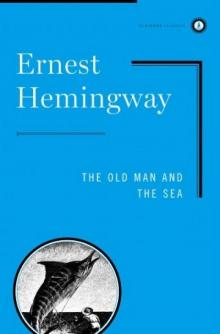 The Old Man and the Sea
The Old Man and the Sea Green Hills of Africa
Green Hills of Africa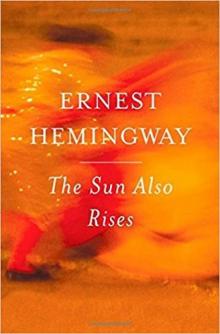 The Sun Also Rises
The Sun Also Rises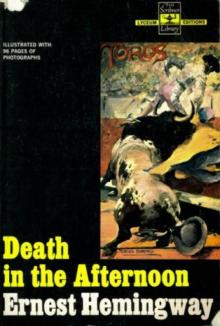 Death in the Afternoon
Death in the Afternoon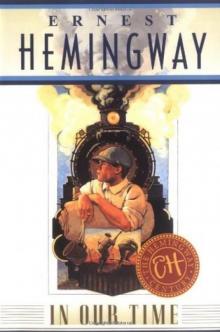 In Our Time
In Our Time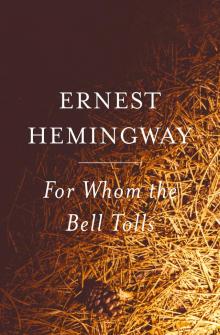 For Whom the Bell Tolls
For Whom the Bell Tolls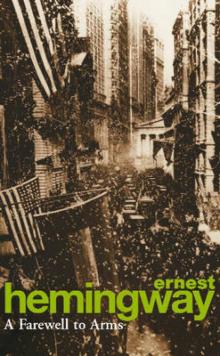 A Farewell to Arms
A Farewell to Arms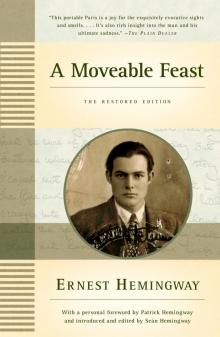 A Moveable Feast
A Moveable Feast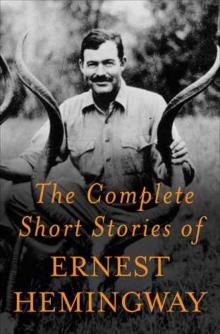 The Complete Short Stories of Ernest Hemingway
The Complete Short Stories of Ernest Hemingway Big Two-Hearted River
Big Two-Hearted River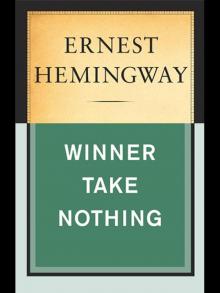 Winner Take Nothing
Winner Take Nothing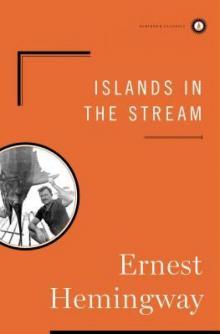 Islands in the Stream
Islands in the Stream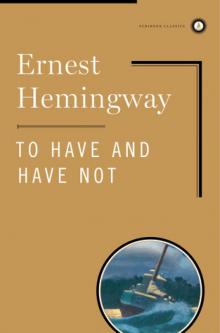 To Have and Have Not
To Have and Have Not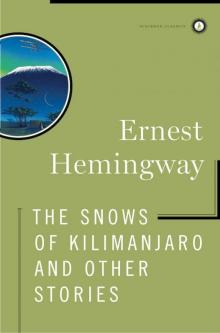 The Snows of Kilimanjaro and Other Stories
The Snows of Kilimanjaro and Other Stories Across the River and Into the Trees
Across the River and Into the Trees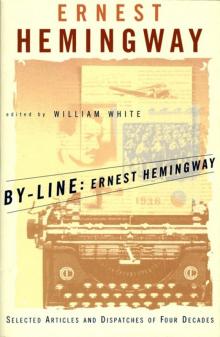 By-Line Ernest Hemingway
By-Line Ernest Hemingway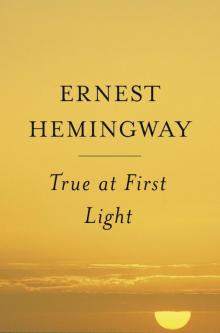 True at First Light
True at First Light Men Without Women
Men Without Women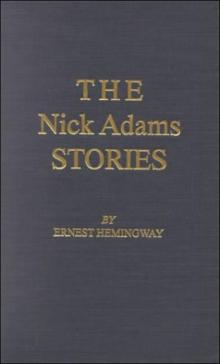 The Nick Adams Stories
The Nick Adams Stories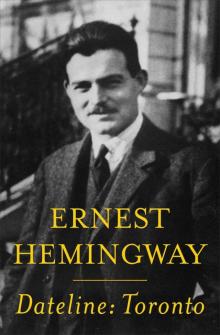 Dateline- Toronto
Dateline- Toronto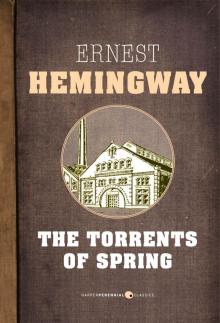 The Torrents of Spring
The Torrents of Spring Short Stories
Short Stories